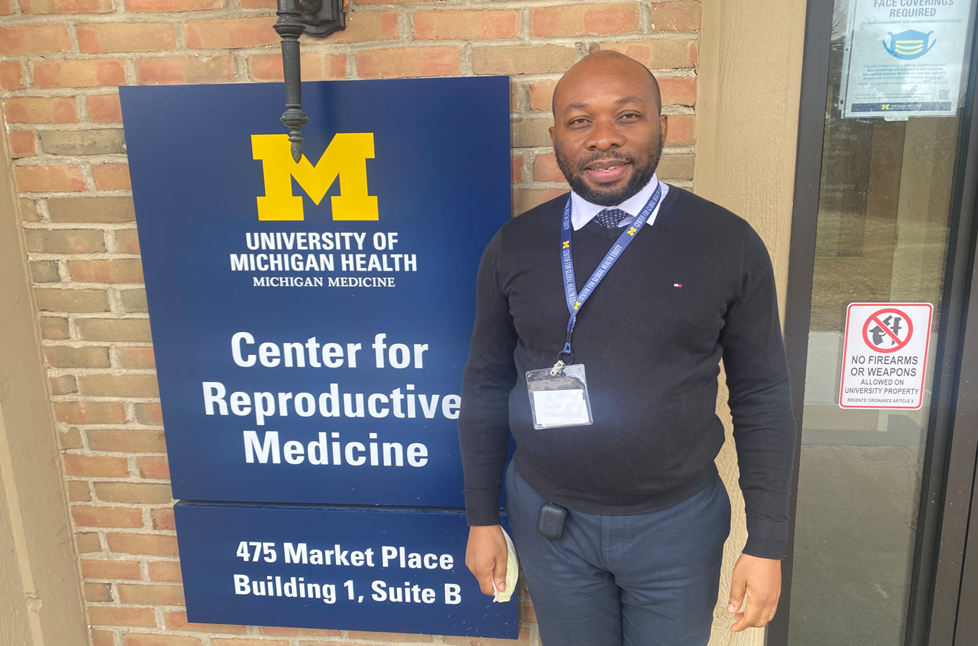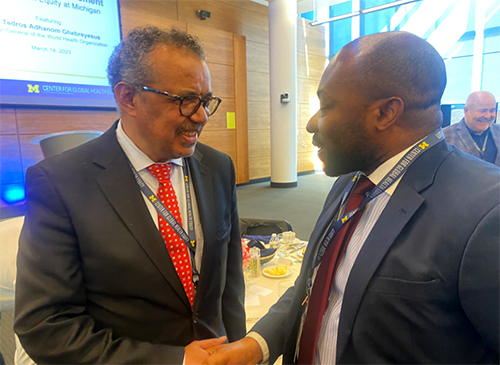
A Ghanaian researcher and visiting scholar is exploring an aspect of women’s health that has been overlooked in his native country: infertility among a growing number of breast cancer survivors.
Promise Sefogah, a University of Ghana Medical School Senior Lecturer and Obstetrician Gynecologist, sees an increasing number of young women who survive their illness but find the treatments have rendered them unable to conceive.
“It’s a big deal in our culture when women cannot have babies. There is a stigma and it can impose a lot of emotional and psychological distress,” said Dr. Sefogah, who is visiting Michigan Medicine as part of a year-long fellowship through the NIH-funded Fogarty International Center.
His research focuses on barriers to fertility preservation uptake among Ghanaian women undergoing breast cancer treatment. Egg preservation and other techniques are options commonly presented to US women undergoing such treatment, but it is not yet standard practice in Ghana, where many women, because of a late-stage presentation and diagnosis, require aggressive chemotherapy and radiation which can damage the ovaries and reduce their ability to conceive.
According to the available data, fewer than 1% of Ghanaian women are offered and take action on fertility preservation options prior to beginning their cancer treatments. Many do not realize the implications until it is too late.
“The impacts can be devastating,” said Sefogah, MB ChB, MSc. “We’ve had women tell us they don’t want to go out socially in their communities because they can’t contribute to conversations that revolve around children and families. We recently woke up to the devastating news of one couple who reportedly committed suicide together because they couldn’t handle the stigma of their infertility.”
“Our goal is to ask the women what they know about fertility preservation, and to find out from clinicians how often they are consulting with their patients about fertility issues, if at all,” Sefogah said.
He is among the first cohort of Fogarty Global Health Fellows under a new program structure that expands eligibility to include more international researchers from limited-resource settings. (Prior fellows were predominantly US-based researchers who spent one year abroad.)
Sefogah and two other Fogarty program fellows have been in Ann Arbor since early March; Augustine Acquah, an engineering researcher, is exploring ergonomic issues and occupational health among workers in large e-waste recycling sites, while Sylvia Takyi, a public health fellow, is researching environmental exposures and illnesses among workers at similar sites.

As part of the year-long experience, each fellow is spending three months at U-M learning from mentors, meeting colleagues in their respective fields, and honing specific research skills, from methodologies to grant and manuscript writing.
During his time at UMMS, Sefogah has engaged with colleagues at the U-M Center for Reproductive Medicine, learning how they approach fertility preservation for breast cancer patients and interface with oncologists and other members of the care team. He’s started a nascent collaboration with the medical school’s clinical simulation center to explore developing a low-cost, high-fidelity task simulator for teaching oocyte (egg) retrieval procedures—an important step in the in-vitro fertilization process. And he has been supporting a group of U-M biomedical engineering students engaged in a project to improve menstrual hygiene among adolescents in South America.
That is in addition to finalizing three manuscripts and a chance meeting with WHO General Director Tedros Adhanom Ghebreyesus during an on-campus event in March.
“Being here has been a very enriching experience, extremely fulfilling and useful,” Sefogah said. “I’ve learned so much, not just about research, but about how to collaborate to maximize my work’s impact.”
